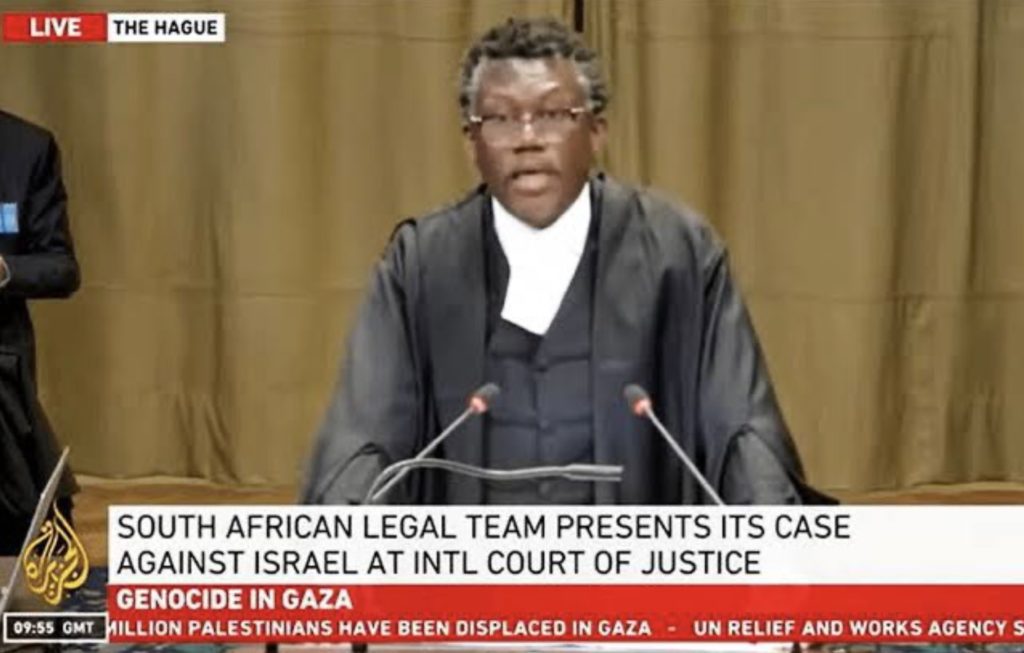Australia/Israel Review
Europa Europa: Upside down in the Hague
Jan 25, 2024 | Alex Benjamin

From the Jewish prophets of yore to 1930s intellectuals like Joseph Roth and Stefan Zweig, in almost every generation there have been those with the prescience to see where a society was heading and warn their contemporaries about the looming consequences.
Since October 7, watching the news, dipping in and out of social media and watching South Africa drag Israel to the International Court of Justice in the Hague for the crime of “genocide”, I have really felt that, to quote George Orwell, the clocks have been striking 13.
Ruth Wasserman-Lande, a former Member of the Knesset, grew up in South Africa. In an interview with her I witnessed recently, she said the world is upside down. She recalled when Apartheid fell in the early 1990s and seeing the different benches on the streets of South African towns – some marked “whites only”, some “blacks only” and some “coloured only” – she said she couldn’t understand at all how the South Africans could allow the word “Apartheid”, with the weight and import it carries, to be misappropriated by those who level the same word at Israel. They were simply demeaning the importance of the word.
She’s right. All anybody needs to do to refute any such claims is take a flight to Ben Gurion Airport and spend an hour or two anywhere in Israel to see how ridiculous they are.
I remember a speech in the European Parliament by Boycott, Divestment and Sanctions (BDS) founder Omar Barghouti a few years ago. He studied at Tel Aviv University. He took some questions from the floor, so I asked him about his experience of going through the separate entrances for Arabs, using the Arabs-only canteens and drinking at the Arabs-only fountains. He fulminated that apartheid means different things.
He appeared to be channelling Humpty Dumpty in Lewis Carroll’s Through the Looking Glass, who famously said, “When I use a word… it means just what I choose it to mean – neither more nor less.”
I remember thinking then how dangerous that concept is. “The very concept of objective truth is fading out of the world. Lies will pass into history,” Orwell wrote.
And now “genocide” is getting the Humpty Dumpty treatment. Genocide is an important word. It is a heavy word. It should be used sparingly and precisely. it should be treated with respect – not for the word itself, but for the countless lives of the murdered contained in those three syllables. They represent the Killing Fields of Cambodia, the mass graves of Rwanda, the ravine at Babyn Yar and most infamously the crematoria of Auschwitz.
Caroline Gennez, a Belgian Government Minister, as the South African delegation was stating their case to the judges in the Hague, joined the language demeaners by asking Germany if they were really wanting to find themselves on the “wrong side of history” by backing Israel.
This is a double insult. I am not here to defend Germany, but I will say that its Government appears to have understood well the consequences of language appropriation (of which the Nazis were disturbingly proficient). It has shown itself particularly aware since October 7 of the weight of words, banning some protests and outlawing the use of certain slogans. My answer therefore to Minister Gennez is that it is actually the Germans who have learned the lessons of history and are not foolish enough to repeat them.
The genocide accusation levelled against the world’s only Jewish state is a particularly reckless and destructive inversion of truth. Israelis were the victims of an attempted and meticulously planned genocide attempt. On October 7, the barbarity and violence against the kibbutzim, concertgoers and hundreds of others – children, women, men and the elderly – left us in no doubt of what Jews could expect if Hamas were to win its war against Israel: Genocide. I am giving the word its full, proper respect when I say this.
As Orwell suggested, we appear to live in a time where games played with language are used as a weapon. Where the way we process words and understand them is being shredded to pieces and re-arranged in a way that suits those who want to vandalise meaning for the sake of political power.
“We have now sunk to a depth at which restatement of the obvious is the first duty of intelligent men,” said Orwell.
I suspect no matter how many times we restate the obvious, the obvious has ceased to be obvious, except to us:
“You are a slow learner, Winston.”
“How can I help it? How can I help but see what is in front of my eyes? Two and two are four.”
“Sometimes, Winston. Sometimes they are five. Sometimes they are three. Sometimes they are all of them at once. You must try harder.”
The days Orwell warned us about in 1984 appear to have arrived, 40 years late.






